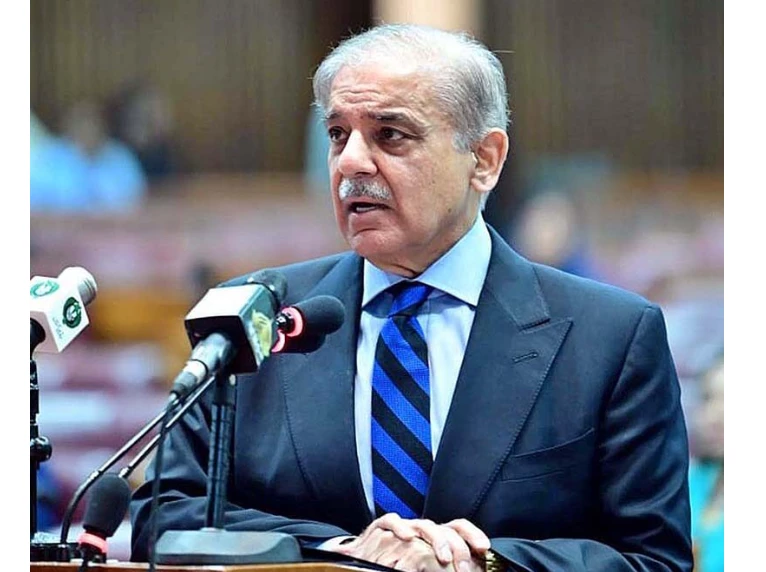The twice-elected prime minister of Pakistan

Stay tuned with 24 News HD Android App

Mian Muhammad Shehbaz Sharif was elected on Sunday as the Prime Minister of Pakistan by securing 201 votes in the National Assembly defeating Omar Ayub Khan of Sunni Ittehad Council who received 92 votes.
Born on September 23, 1951, he is now the twice-elected Prime Minister of Pakistan and thrice-elected Chief Minister of Punjab. He is the younger brother of Pakistan Muslim League-Nawaz Quaid Nawaz Sharif, the thrice-elected premier of the country.
Shehbaz Sharif’s first stint of the premiership spanned from April 11, 2022 to August 14, 2023. He was elected by the Pakistan Democratic Movement (PDM) by ousting Imran Khan through a vote of no confidence in the National Assembly.
Coming from a renowned business family, Shehbaz Sharif graduated from Government College, Lahore and
served as President of the Lahore Chamber of Commerce and Industry in 1985 before entering the politics.
He held positions as a Member of the Punjab Assembly from 1988 to 1990 and a Member of the National Assembly from 1990 to 1993. He later served as Leader of the Opposition in the Punjab Assembly from 1993 to 1996. In 1997, he was elected Chief Minister of Punjab and and served till 1999 when as a result of coup, his government, along with the federal government, was toppled.
Shehbaz Sharif played a leading role in the restoration of democracy in the country and was elected unopposed as Member of Punjab Assembly for the fourth time in 2008, and served as Punjab chief minister for the second time from June 2008 to March 2013.
After getting elected on three provincial assembly seats and on one National Assembly seat in 2013 general elections, Shehbaz was elected as Punjab Chief Minister for the third time.
Shehbaz Sharif’s dynamic leadership and efficient administration earned him the title of “Shehbaz Speed” from China.
Under his leadership, Pakistan swiftly tackled its energy crisis, completing the Sahiwal Coal Power Plant in a record 22 months and implementing three RLNG-power projects in Punjab.
He spearheaded the establishment of the Metro Bus System, providing state-of-the-art traveling facilities in Lahore, Multan, and Rawalpindi/Islamabad. The transformative projects like the Lahore Orange Line Metro Train was also among his government’s famed initiatives that revolutionized transportation.
His administration focused on upgrading schools, merit-based hiring of educators, and establishing the Punjab Educational Endowment Fund, supporting over 350,000 deserving students. To his credit, the innovative programs like the Daanish Schools in South Punjab and the laptop scheme are also included.
Besides launching Zeevar-e-Taleem program featuring the provision of stipend to over half a million girls of South Punjab, Shehbaz Sharif also led an education program for the children of brick kiln workers that resulted in the enrolment of about 100,000 out-of-schoolchildren back to schools.
Shehbaz Sharif’s government made significant reforms in the health sector, including the division of health departments into specialized healthcare and primary/secondary healthcare, and establishment of new hospitals, medical universities, and innovative institutions like the Pakistan Kidney and Liver Institute and Research Center, as well as the country’s first forensic laboratory.
During the 2011 dengue outbreak in Punjab, Shehbaz Sharif demonstrated effective leadership by collaborating with Sri Lankan health authorities to develop a comprehensive anti-dengue policy which led to control the virus.
Under Shehbaz Sharif’s leadership, groundbreaking initiatives like the establishment of the Information Technology University and the Punjab Land Records Management and Information System revolutionized governance in the province.
He also championed pro-women reforms during his tenure, ensuring enhanced job quotas, inheritance rights, and comprehensive anti-harassment laws in Punjab.
Since 2018 till becoming the premier in 2022, he has served as the leader of the Opposition in the National Assembly, advocating for democracy, human rights, and the rule of law.
During his first stint, Shehbaz Sharif’s government faced multiple challenges including the historic floods of 2022 which submerged nearly one-third of the country and affected 33 million people leaving an adverse impact on the national economy.
However, the prudent economic policies of his government averted the country’s economic default.
In his recent address at the party’s parliamentary session here, Nawaz Sharif appreciated Shehbaz Sharif’s performance as the prime minister. “The way he [Shehbaz] stopped the country from defaulting is unprecedented,” Nawaz Sharif said.–APP
